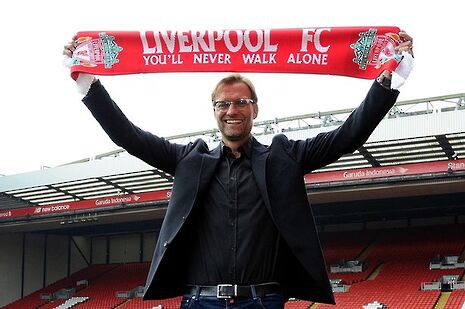For Jürgen Klopp, the beautiful game is not just beautiful, but clever too
The Liverpool manager’s energy and passion come with a unique, high-minded intellectual side, argues columnist Jonty Leibowitz

Before we start, I should admit that I am no great fan of Jürgen Klopp. The hair, the glasses, the rock-and-roll shtick – it all seems to me to be slightly too forced. There is something over the top about running down the touchline and pumping your fists when your team have secured a point against West Bromwich Albion.
However, it is hard to argue with the team he is putting together at Liverpool. In the opening weeks of the Premier League, they have scored the most goals, run the most miles, and played some breath-taking football. Manchester City and my own beloved Tottenham aside, Liverpool are the great entertainers of this Premier League season.
There is so much to love about this team: the individual trickery of Brazilian artists Philippe Coutinho and Roberto Firmino, the dogmatic running of Sadio Mané, or even the reinvention of the tireless James Milner, the workhorse of British football.
But what I love about Klopp is not so much what happens on the pitch, as what happens off it. Put simply, he is a master tactician and thinker. He is one of those rare managers who can use the word ‘philosophy’ and get away with it.
It has become all too common for managers to use such grand programmatic gestures. In most cases, it is unjustified guff –Brendan Rodgers and Alan Pardew come across a little too David Brent when they talk about how their use of the sloppy 4-2-3-1 formation resembles anything close to a ‘philosophy’.
But, with Klopp, it is justified. He might not have the suave intellect of a Pep Guardiola, but that does not matter. His football intellect comes not from studying the pages of the Cruyff textbook, but from emotion and feeling: more Slavoj Žižek than A.J. Ayer.
Take Klopp’s appearance on Sky Sport’s Monday Night Football a few weeks ago. The Monday Night Football studio might look like a bad parody of Mitchell and Webb’s ‘Endless Football’ sketch, but, in fairness to Jamie Carragher and co., they do some good analysis. And when Klopp came onto the show, it went up another level.
What emerged over 27 minutes was a clear sense that Jürgen Klopp’s brilliance is rooted in a rigorously intellectualised analysis of how to play good football. He walked Carragher through the thinking behind his infamous ‘Gegenpressing’ strategy – the idea that a team should unite against the opposition on losing possession of the ball – describing how it was the "best playmaker" because it forces the opponent to keep the ball so high up the pitch. This might sound obvious in 2016, but it is easy to forget how innovative and recent this is.
Carragher showed Klopp a clip of him celebrating his players’ successful pressing as if they had scored a goal. Wasn’t this level of fervour about a tackle slightly odd, he asked. Klopp’s answer was illustrative of how deeply he thinks about every aspect of the pitch. “The reason I love situations like this is not because of it, but because I know what it means for the game.”
“What it means for the game.” In this throwaway comment, Klopp was making it clear that his analysis of football is so deep that every aspect of the whole 90 minutes is essential to informing his understanding. It is the equivalent of reading every single word of every single book on a supervision reading list – a skill most students would find unmanageable in scope and scale. But, for Klopp, this attention to detail is programmatic.
And yet – amid the intricate planning – there is still a hint of mystery and mischief which makes the Klopp philosophy so intriguing. When asked about the fluidity of players in the final third, Klopp replied that his thinking “only went so far”, and that when it came to the scoring end of the pitch, there is only so much a manager can do.
In this mantra – admittedly borrowed from Pep Guardiola – Klopp is genius enough to admit the limits of careful planning. In other words, sometimes the ball goes in, and sometimes it does not. Go figure.
There are probably very few readers who will get as excited as I did by seeing a football manager spending half an hour on a Monday night explaining the boring intricacies of his football. But there is beauty there. The unique capacity of a select few to take the game we love, and make it everything it is meant to be – exhilarating, intellectual, and in pursuit of beauty.
If you do not believe me, take a look at four minutes of Johann Cruyff and a chalkboard. If not, I’ll go back to writing about Big Sam next week...
 Comment / Plastic pubs: the problem with Cambridge alehouses 5 January 2026
Comment / Plastic pubs: the problem with Cambridge alehouses 5 January 2026 News / Uni-linked firms rank among Cambridgeshire’s largest7 January 2026
News / Uni-linked firms rank among Cambridgeshire’s largest7 January 2026 News / New movement ‘Cambridge is Chopped’ launched to fight against hate crime7 January 2026
News / New movement ‘Cambridge is Chopped’ launched to fight against hate crime7 January 2026 News / SU stops offering student discounts8 January 2026
News / SU stops offering student discounts8 January 2026 News / Cambridge businesses concerned infrastructure delays will hurt growth5 January 2026
News / Cambridge businesses concerned infrastructure delays will hurt growth5 January 2026








